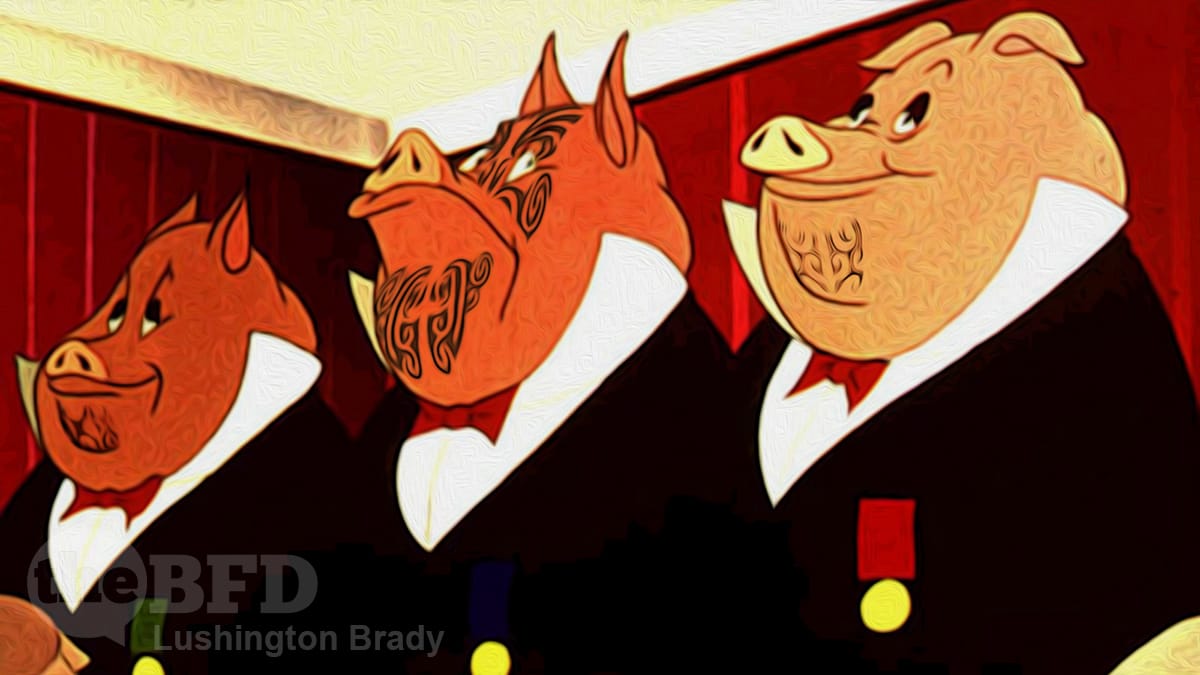Table of Contents
It’s been a common joke, these last few years, to remind the left that 1984 was a warning, not an instruction manual. But if New Zealanders are looking for a novel that really sounds a warning for their country, they’d be better off looking at Animal Farm.
It’s not just that Animal Farm is an allegorical jeremiad against Communism (so much so that Communist agents in Britain actively worked to stop its publication), which obviously resonates for a country run by a former leader of an organisation spawned by the Second International. Where Animal Farm really becomes a ringing klaxon for New Zealand is its most famous line:
some animals are more equal than others
Because that’s the abyss into which New Zealand is plummeting under Jacinda Ardern. The nation is hastily tossing aside the common law principle that all citizens are equal, in favour of a political-legal system where some are more equal than others. Solely on the basis of race.
For one and a half centuries, New Zealand law and Maori custom (tikanga) have sat side by side. But their interactions were limited, and the only laws enforceable were those laws passed by Parliament and made by judges. State-made law was dominant over tribal rules.
This is not unlike the situation of, say, Canon Law in the Church, or Judaic Law in Jewish communities. They were still subordinate to the Common Law. In the end, the law of the land ruled equally for all.
Even customary title is based in common law, by recognising property rights that were not extinguished by statute or adverse possession.
Not anymore, in New Zealand.
Two Bills proposed by the New Zealand Government to replace the Resource Management Act go much further than that. More than any other legislation before, the Natural and Built Environments Bill (NBE) and the Spatial Planning Bill embody what are presented as Maori legal concepts. Whether these really give enough certainty to justify treatment as legal concepts is now a vital matter for New Zealanders.
Right at the start of the NBE, the Bill states the following goal: “The recognition of, and making provision for, the relationship of iwi and hapu and the exercise of their kawa, tikanga (including kaitiakitanga), and matauranga in relation to their ancestral lands, water, sites, wahi tapu, wahi tupuna, and other taonga”.
As is increasingly the case in New Zealand, the Government couch their agenda in a language almost no one in the country speaks. Just as the Norman elite conducted their political and legal business in a language their Anglo-Saxon subjects couldn’t understand.
The principle is the same: keep the hoi polloi in the dark while the elite rob them blind.
Besides, piously wittering about “kaitiakitanga” is less obviously ludicrous than trying to convince anyone of “the Maori concept of looking after the environment”. The moa, the Haast’s eagle, not to mention more than 30 other species of birds, bats, three to five species of frogs and numerous lizard taxa, as well as the vast tracts of forest burned by the Maori colonisers, would like to have a word about the Maori concept of looking after the environment.
Consider as well “matauranga Maori” as a source of legal principles: beliefs that include fire being a product of a goddess’s fingers, that the stars need to be offered food for their sustenance, and that monsters inhabit lakes and cause earthquakes.
Judges familiar with Maori culture may purport to distil the legal significance of such terms. However, tribal elders and some experts emphasise they differ in meaning for each iwi. Meanwhile, other experts, including the only Maori judge on the Supreme Court, assert that it is not for the courts to declare tikanga or to change it. It is only for them to ascertain it from its tribal custodians.
Try to imagine a court basing its rulings on, say, the Book of Deuteronomy, and the fury that would ensue. Yet put religious superstitions in a grass skirt instead of a cassock, and they become unquestionable legal facts.
Is this the way to run a 21st-century nation?
These terms are not just legal or political puffery. They present as core elements of the Bill. Tikanga is mentioned 31 times throughout. Matauranga Maori comes up 26 times. Kaitiakitanga can be found in seven places. They all beat “property right”, which only features three times […]
This Bill takes the integration of purported Maori custom into the New Zealand legal system to a new level. It prominently enshrines various Maori concepts as sources of law which may not be properly known even to most New Zealand lawyers, let alone lawyers in other common law jurisdictions.
We may thus see the emergence of a new legal system in New Zealand – and perhaps a new system of government, too. The new system seems unlikely to be compatible with key elements of the rule of law, as generally understood.
The Australian
Most ominously, the Bill is part of a degeneration of the rule of law in New Zealand which will explicitly negate the principle of equality before the law. Rights will instead be determined selectively on the basis of a citizen’s race.
Some animals will be very much more equal than others.










